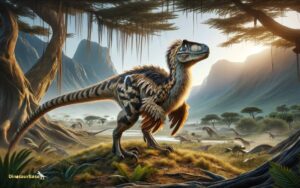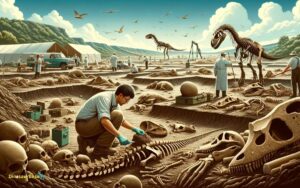What Does Dinosaur Mean
Dinosaurs fascinate, terrify, and intrigue; they're creatures that have captured the imagination of many for centuries.
The term itself, coined in the early 19th century by Sir Richard Owen, carries an etymology that sheds light on how these prehistoric creatures were perceived. It's a blend of the Greek words for 'terrible' and 'lizard,' yet this simplistic translation barely scratches the surface of its cultural and scientific significance.
As one peels back the layers of its origin, the discovery's influence and the term's evolution over time reveal a story that intertwines with the very fabric of human curiosity and our understanding of the natural world.
This narrative not only explores the depths of ancient life but also how these majestic creatures continue to shape our cultural and scientific landscapes.
Key Takeaways
- The term 'dinosaur' originates from Greek, meaning 'terrible lizard', reflecting their awe-inspiring nature.
- Coined by Richard Owen, 'Dinosauria' established a classification for these ancient reptiles in scientific study.
- Dinosaurs have evolved from being seen as mere reptiles to complex creatures with diverse traits and behaviors.
- They are cultural icons, influencing media, science, and public fascination with Earth's prehistoric past.
The Origin of "Dinosaur
The term 'dinosaur' originates from the Greek words 'deinos,' meaning terrible or wondrous, and 'sauros,' meaning lizard or reptile, coalescing into a designation that reflects the awe-inspiring nature of these ancient creatures.
This foundational nomenclature underscores not only the physical grandeur and formidable presence of dinosaurs but also the profound impact they've had on scientific thought and popular culture. Scholars assert that this etymology encapsulates the dual nature of dinosaurs as subjects of both fear and fascination, a testament to their enduring legacy in the human imagination.
It's a precise lexicon choice that has shaped the discourse around paleontology, guiding how generations perceive these prehistoric giants. The term's origin serves as a cornerstone for the scientific classification and study of these extinct beings, embodying their significance in natural history.
Unpacking the Etymology
Delving deeper into the etymology, it's clear that the term 'dinosaur' encapsulates a fascinating blend of awe and trepidation, providing a window into humanity's perennial fascination with these ancient titans. The name itself, derived from Ancient Greek, is a testament to the creatures' imposing presence in both historical narratives and scientific inquiry.
| Component | Greek Origin | Meaning |
|---|---|---|
| Dino | Deinos | Terrible |
| Saur | Sauros | Lizard |
| -us | -us | Latinization Suffix |
This linguistic construction—melding 'terrible' with 'lizard'—imbues the term with a sense of majesty and fear, reflecting the complex relationship humanity has with these long-extinct behemoths. It underscores an inherent respect and curiosity, driving scientific exploration and cultural fascination.
The Discovery Influence
Understanding the etymology of 'dinosaur' sets the stage for exploring how their discovery profoundly influenced both scientific thought and public imagination. The revelation of these ancient creatures reshaped our understanding of Earth's history, challenging previous notions and sparking curiosity worldwide.
Key influences include:
- Revolution in Paleontology: The discovery catalyzed the development of paleontology as a scientific discipline, fostering methodologies to unearth and interpret fossils.
- Shift in Evolutionary Theory: It provided critical evidence for evolutionary biology, illustrating the concept of natural selection and species adaptation over time.
- Cultural Fascination: Dinosaurs captured the public's imagination, inspiring a multitude of media, from literature and films to educational programs, broadening societal engagement with science and our planet's prehistoric past.
Each aspect underscores the transformative impact of dinosaur discoveries on both the scientific community and society at large.
Richard Owen's Contribution
Richard Owen's groundbreaking classification of dinosaurs not only coined the term but also laid the foundation for modern paleontology, marking a pivotal moment in scientific history.
Through meticulous study and comparison of fossilized bones, Owen discerned that these remains belonged to a distinct group of prehistoric reptiles, which he named 'Dinosauria,' meaning 'terrible lizards.'
His work in the mid-19th century catalyzed a paradigm shift, challenging contemporary views on the diversity of ancient life and the process of natural selection.
Owen's contributions extended beyond nomenclature; he established a framework for identifying dinosaurs based on skeletal morphology, thereby pioneering methods that underpin paleontological research to this day.
His analytical rigor and innovative approach have left an indelible mark on the field, underscored by the enduring relevance of his classifications.
Dinosaur: A Cultural Icon
Over the centuries, dinosaurs have transcended their scientific origins to become cultural icons, captivating the imagination of people across the globe. This evolution from ancient creatures to modern symbols has been facilitated by their diverse representations in various forms of media and public discourse. Dinosaurs symbolize both the majesty and mystery of the natural world, serving as a bridge between the past and present.
- Movies and Literature: Dinosaurs have been central figures in movies and books, often depicted as both terrifying predators and gentle giants, reflecting humanity's complex relationship with nature.
- Museum Exhibits: They're the stars of museum exhibits worldwide, drawing millions of visitors eager to learn about these prehistoric creatures.
- Education: Dinosaurs play a pivotal role in education, sparking children's interest in science and history through engaging stories and interactive displays.
Evolution of the Term
The term 'dinosaur' has undergone a significant evolution since its inception in the early 19th century, reflecting shifts in scientific understanding and public interest.
Initially coined to describe a small group of large, extinct reptiles, its scope has widened as paleontologists discovered more species, revealing a diverse group that includes both gigantic and small creatures.
Early interpretations largely depicted dinosaurs as sluggish, cold-blooded reptiles. However, subsequent fossil discoveries and advancements in technology have painted a more dynamic picture, emphasizing their variety in size, habitat, and behavior.
This evolving definition mirrors the progress in paleontology, transitioning from a simplistic view to recognizing dinosaurs as a complex assembly of species that dominated the Earth's ecosystems for millions of years.
Modern Interpretations
In recent years, a multitude of scientific advancements has significantly reshaped our understanding of dinosaurs, painting them as complex, dynamic creatures far removed from their once-presumed sluggish and simplistic reptilian ancestors. These revelations have altered the modern interpretation of dinosaurs in several key ways:
- Feathered Dinosaurs: Evidence suggests many species boasted feathers, not just scales, challenging the traditional image of these creatures.
- Social Behaviors: Research indicates complex social structures among certain dinosaur groups, including nurturing of young and possibly even cooperative hunting strategies.
- Warm-bloodedness: Studies propose that at least some dinosaurs were endothermic, maintaining their body temperature independently of the environment, which hints at a metabolism more akin to modern birds than to reptiles.
These insights underscore dinosaurs as not merely ancient relics but as once-living organisms with intricate behaviors and physiological traits.
Conclusion
In conclusion, the term 'dinosaur' has evolved far beyond its etymological roots, metamorphosing from a simple scientific designation into a cultural leviathan that captures the imagination and fuels scholarly pursuits. Richard Owen's seminal contribution not only coined a term but also laid the foundation for a field that continually reshapes our understanding of the natural world.
As the term 'dinosaur' adapts and endures, it reflects humanity's insatiable curiosity and our quest to decipher the mysteries of our planet's ancient inhabitants.




